|
|
|
Sort Order |
|
|
|
Items / Page
|
|
|
|
|
|
|
| Srl | Item |
| 1 |
ID:
168550
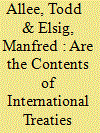

|
|
|
|
|
| Summary/Abstract |
Most accounts of international negotiations suggest that global agreements are individually crafted and distinct, while some emerging scholarship suggests a heavy reliance on models and templates. In this research, we present a comprehensive test of whether new international treaties are heavily copied and pasted from past ones. We specify several reasons to expect widespread copying and pasting, and argue that both the most and least powerful countries should be most likely to do so. Using text analysis to examine several hundred preferential trade agreements (PTAs), we reveal that most PTAs copy a sizable majority of their content word for word from an earlier agreement. At least one hundred PTAs take 80 percent or more of their contents directly from a single, existing treaty—with many copying and pasting 95 percent or more. These numbers climb even higher when we compare important substantive chapters of trade agreements, many of which are copied and pasted verbatim. Such copying and pasting is most prevalent among low-capacity governments that lean heavily on existing templates, and powerful states that desire to spread their preferred rules globally. This widespread replication of existing treaty language reshapes how we think about international cooperation, and it has important implications for literatures on institutional design, policy diffusion, state power, and legal fragmentation.
|
|
|
|
|
|
|
|
|
|
|
|
|
|
|
|
| 2 |
ID:
127060
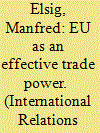

|
|
|
|
|
| Publication |
2013.
|
| Summary/Abstract |
Drawing on the European Union (EU) foreign policy literature on effectiveness, this article studies how the European Union chooses judges to serve on the World Trade Organization's key judicial institution: the Appellate Body. Conceptually, the article differentiates between effectiveness in representation and effectiveness in impact. The article shows how delegation to the European Commission has increased the strategic agenda-setting power for championing its preferred candidates. The article further compares European and US practice in nominating candidates. Overall, the article finds that effectiveness in representation has increased over time. In terms of effectiveness in impact, the article shows how the international environment conditions the EU's influence. The article also exposes the difficulties of studying the effectiveness of EU external relations due to the peculiar decision-making processes dominant in judicial bodies.
|
|
|
|
|
|
|
|
|
|
|
|
|
|
|
|
| 3 |
ID:
107754


|
|
|
|
|
| Publication |
Cambridge, Cambridge University Press, 2011.
|
| Description |
xviii, 348p.
|
| Standard Number |
9781107004887, hbk
|
|
|
|
|
|
|
|
|
|
|
|
Copies: C:1/I:0,R:0,Q:0
Circulation
| Accession# | Call# | Current Location | Status | Policy | Location |
| 056258 | 382.92/COT 056258 | Main | On Shelf | General | |
|
|
|
|
| 4 |
ID:
133649
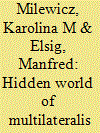

|
|
|
|
|
| Publication |
2014.
|
| Summary/Abstract |
Why do new EU democracies engage in multilateralism? The dominant explanation proposes that new democracies use international treaties to lock in domestic reforms. This article offers a novel explanation as to why new EU democracies participate in multilateral treaties. We argue that ratifying a treaty serves three external signaling purposes (recognition concerns, increasing strategic autonomy, and pleasing the European Union). We test our argument through a mix of quantitative and qualitative methods. First, we apply event history analysis. Drawing on a new ratification data set comprising 76 multilateral treaties, we illustrate the prominent role of new EU democracies in multilateralism as compared to other new democracies. Second, to assess the importance of external signaling in the decision to ratify multilateral treaties, we examine parliamentary ratification debates in selected Central and Eastern European countries. Third, we compare parliamentary discussions across European and non-European new democracies to demonstrate the different motives driving their approaches toward multilateralism.
|
|
|
|
|
|
|
|
|
|
|
|
|
|
|
|
| 5 |
ID:
160572
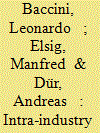

|
|
|
|
|
| Summary/Abstract |
This research note presents a new dataset on the speed of tariff liberalization in sixty-one preferential trade agreements (PTAs) signed by fifty states and regional economic organizations over the period 1995 to 2013. We use this dataset to test prominent arguments concerning the impact of intra-industry trade and global value chains on the political economy of trade. Our results indicate that the speed of tariff liberalization through PTAs is considerably faster for intermediate goods than for finished products. This is in line with the most prominent argument about how global value chains affect the political economy of trade liberalization. At the same time, we find mixed evidence for the impact of intra-industry trade on the ease of trade liberalization, which reflects strong cross-country variation. We conclude with a discussion on how the dataset can help tackle important questions in international political economy and inform ongoing debates on trade agreements.
|
|
|
|
|
|
|
|
|
|
|
|
|
|
|
|
| 6 |
ID:
146158


|
|
|
|
|
| Summary/Abstract |
Existing research indicates the interrelated nature of different dimensions of the design of international institutions. In particular, it shows the greater flexibility of deep agreements. We argue—and demonstrate empirically—that the positive relationship between depth and flexibility holds for preferential trade agreements (PTAs). But we add two qualifications to the conventional wisdom that depth and flexibility go hand in hand. First, we argue that the positive relationship between depth and flexibility proves weaker for democracies than for nondemocracies. Second, when making deep agreements more flexible, countries also add strings to the use of the additional flexibility provisions. An original data set on the design of 587 PTAs allows us to test our arguments. Both descriptive evidence and multivariate statistics support the theoretical expectations. The findings contribute to the literatures on the design of international institutions and the causes and consequences of PTAs.
|
|
|
|
|
|
|
|
|
|
|
|
|
|
|
|
| 7 |
ID:
155712
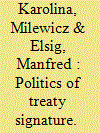

|
|
|
|
|
| Summary/Abstract |
The literature on international cooperation through legal commitments focuses chiefly on treaty ratification. What has received much less attention is that before states ratify treaties, they commit to treaties through the act of signature. This article addresses this research gap by investigating how a state’s decision to sign a treaty is affected by its diplomatic representation during treaty negotiations. Conceptualizing signature as a commitment step, we argue that participation in treaty negotiations translates into a “ties-that-bind” effect creating incentives for diplomats to support the treaty text leading to treaty signature. Our empirical analysis uses a new data set on signature and tests the argument for 52 multilateral treaties concluded between 1990 and 2005. Results confirm that participation in treaty making matters for signature but not necessarily for ratification.
|
|
|
|
|
|
|
|
|
|
|
|
|
|
|
|
| 8 |
ID:
107610


|
|
|
|
|
| Publication |
2011.
|
| Summary/Abstract |
This article analyses the World Trade Organization within a principal-agent framework. The concept of complex agent is introduced to focus on the variety of actors that comprise an international organization. Special attention is paid to the relationship between contracting parties' representatives and the Secretariat. In the empirical part, the article analyses the role of the Secretariat in assisting negotiations and presents evidence of declining influence. It is shown how principal-agent theory can contribute to addressing this puzzle of 'missing delegation'. The article concludes with a cautionary note as to the 'location' of international organizations' emerging pathologies and calls for additional research to address the relationship between material and social sources to explain behaviour of the key actors within the complex agency.
|
|
|
|
|
|
|
|
|
|
|
|
|
|
|
|
|
|
|
|
|